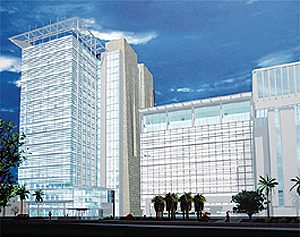Research and Patient Care Initiatives
Seek to Raise Medical School Efficiency
Reinventing the School of Medicine
![]() wo
major initiatives aimed at raising the levels of excellence and efficiency
at the School of Medicine are nearing final recommendations.
wo
major initiatives aimed at raising the levels of excellence and efficiency
at the School of Medicine are nearing final recommendations.
“We are working to develop an overall new strategy for research and patient care,” said John G. Clarkson, M.D., senior vice president for medical affairs and dean. “This is positioning the school for the 21st century.”
 |
||
Working with the consulting firm AltshulerGray, the committee first gathered facts—about School of Medicine research funding, about research at comparable medical schools, about our faculty’s perceptions of what works well and what could be improved. The group looked at resources, space, core facilities, the size of the faculty, faculty development and collaboration, and our ability to attract graduate students and postdoctoral fellows.
Committee members then developed criteria to evaluate models of organizational change to expand our research capabilities, and came up with alternative models. A final report and recommendations will be refined by the consultants and considered by the group next month.
“Rethinking strategic priorities is not unique to the University of Miami,” says Richard Bookman, Ph.D., associate dean for graduate studies. “To keep growing at a time of increased competitive pressures, we need to make sure every research dollar spent is spent well.”
A similarly broad review of the clinical operation is nearing completion. The leadership of the University of Miami Medical Group (UMMG), with direction from Dean Clarkson and President Donna E. Shalala, set out to find ways to improve service to patients, operate more efficiently, and pay more competitive salaries.
“The clinical enterprise is different from everything else a university does,” says Minor Anderson, associate vice president for medical affairs and managing director of UMMG. “The question we want to answer is, how do we position this vital business to act like a real business?”
Fundamental to any improvement of the practice, Anderson says, is a change in the way it is governed. The dean and the chairs of the clinical departments will play a stronger role in the reconstituted UMMG, making possible bigger, faster improvements. The governing board and the executive committee will have clearly defined responsibilities that advance the practice’s strategic plan.
Work groups on governance, operations, University and School of Medicine policies, physician compensation structures, and clinical budgets and financial reporting have gathered information and are reporting back to the steering committee.
A parallel process is under way to evaluate the school’s self-insurance program for medical malpractice. Even as the number of critical incidents has declined, the estimated cost per case has increased, creating an unsustainable burden for the school. Faced with staggering shortfalls in the self-insurance fund, the School of Medicine has gone to the Florida Legislature the past two sessions to ask for sovereign immunity when treating patients at public Jackson Memorial Hospital.
The efforts have attracted significant community support, including a strong editorial in The Miami Herald. But the legislation has not been successful, and the solution is not yet clear. Working with Marsh Consultants, the school is considering several recommendations for meeting the current challenge.
The goal, in conjunction with the patient safety initiative supported by the school and the Public Health Trust, is to improve the quality of care while reducing me
dical errors and cutting costs to the University and the Trust.
Dean Clarkson says of the research, patient care, and self-insurance initiatives, “These three critically important issues are being addressed simultaneously in an effort to help propel the medical school to the next level.”